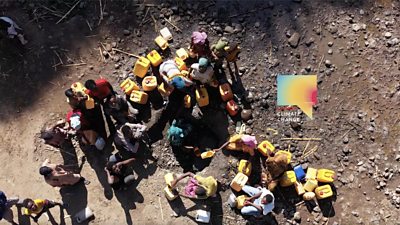Amid instability and conflict, the people of Oromia region in Ethiopia are also increasingly affected by extreme drought and flooding. Five consecutive failed rainy seasons led to the worst drought in 40 years; this was followed by major flooding in the rainy seasons in 2023, displacing many, and destroying livelihoods. Across Eastern Africa, tens of millions are facing food insecurity.
Our research has found that often people understand actions they can take to begin to adapt to climate change - but that they often struggle to afford and implement them.
With support from Down2Earth, BBC Media Action in Ethiopia produced two films exploring how communities in Oromia Region are experiencing climate change - and how they plan to adapt, if they could afford the solutions.
Maka's story
Maka Musa, a mother of 12 from Gulufa village in southern Ethiopia, remembers a time when farming flourished with high yields of sorghum, barley, onions, and green peppers. However, because of climate change and reduced rainfall, her way of life has changed dramatically. Water shortages prevent Maka from planting crops, even though she has vegetable seeds. The lack of water has also made it difficult to raise livestock like goats, leaving her struggling to provide for her family.
While facing these challenges, Maka’s husband migrates with their cattle, and she stays behind to care for their children and goats. She travels long distances for water to keep the goats alive, milks them for food, and sells them for income. Due to the ongoing drought, the family can no longer farm and must sell goats to buy crops and other necessities. Despite the hardships, Maka remains hopeful for a solution - if only she could afford the cost.
Jawar's story
Jawar Umer in Gorbo Kebele, Mieso District recalls how his family once enjoyed a good life with plenty of milk, butter, and a thriving farm. However, amid severe drought linked to climate change, their cattle herd has drastically decreased from 30 to just one, and they now rely on aid to survive. Water is scarce, rivers are drying up, and crop cultivation has become challenging. Jawar has been digging a pond for five years to collect rainwater but doesn't have the money to finish digging it, or to buy a liner and cover needed to use it effectively.
Jawar believes that with the right support to adapt, his family could have avoided migration, maintained their farm, and ensured their children could attend school.
Our people, our planet
Search by Tag:
- Tagged with Ethiopia Ethiopia
- Tagged with Climate change Climate change
